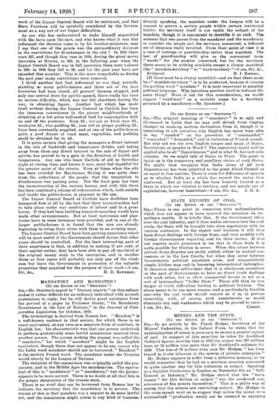MANDATORY AND MANDATED?
[To THE EDITOR or THE " SPECTATOR."]
Sia,—Dr. Stanton's appeal to " literary experts " on this subject makes it rather difficult for an ordinary individual with no such pretensions to reply, but he will derive great assistance from the perusal of a paper by Professor Goudy, " On Mandatory Government in the Law of Nations," in the Journal of Com- parative Legislation for October, 1919.
The terminology is derived from Roman law. " Mandate " is a wall-known contract in that system, for which there is no exact equivalent, at any rate as a separate form of contract, in English law. Its characteristic was that one person undertook to perform gratuitously some lawful commission received from another person. The person making the request was called the " mandator," for which " mandant " might be the English equivalent, though there does not appear to be any reason why the Latin word mandator should not be borrowed. " Mandant " is the modern French word. The mandator under the Treaties would clearly be the League of Nations.
The recipient of the commission was originally called the pro- curator. and in the Middle Ages the mandatarius. The equiva- lent of this is " mandatary " or " mandatory," but the former appears to be more correct. There is no doubt at all that this is the proper designation of the trustee state.
There is no word that can be borrowed from Roman law to indicate the territory that the mandatary is to govern. The reason of this is that mandate was a request to do some lawful act, and the commission might relate to any kind of business.
Strictly speaking, the mandato under the League will be a request to govern a certain people within certain territorial limits; the territory itself is not really the subject of the Mandate, though it is convenient to describe it as such. The moment that one passes from the mandator and the mandatary to consider the people and the territory concerned, a different set of ideas are really involved. From their point of view it is a case of tutelage or guardianship rather than mandate. The law of guardianship will give us the convenient term " wards " for the peoples concerned, but for the territory there seems to be nothing available except a clumsy mouthful like " mandate-territory " or " ward-territory."—I am, Sir, &o.,
[If there must be a clumsy mouthful—and we fear there must be—" mandate-territory " is to be preferred, because it retains the guiding word " mandate." It-is most important to simplify political language. Why introduce another word to indicate the same thing? Were it not for this consideration, we would suggest " ward-land " as a suitable name for a territory governed by a mandatory.—ED. Spectator.]


































 Previous page
Previous page